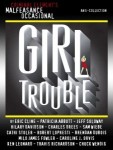A few months ago on Facebook there was talk about the value of an MFA. In particular, writer Holly West put up a post Facebook about asking what people thought and she got a bunch of passionate answers for and against it. (More opinions were in the latter category if I remember correctly.) Elaine Ash, aka Anonymous-9, has a 6 part blog series along with Lisa Ciarfella asking authors about the value of MFAs. You can read the original post which has links to the other interviews here. https://ashedit.wordpress.com/2015/06/26/to-mfa-or-not-to-mfa-that-is-the-question/
If I lived in a perfect world with infinite time and resources, I would definitely pursue an MFA. I’d also try to get a PhD in history too and maybe extend my economics background a little further. But most likely that’s never going to happen. As John Lennon said, “Life is what happens while you’re busy making other plans.”
About the same time as the MFA talk was going around, HarperCollins was hyping their release of Harper Lee’s GO SET A WATCHMAN. Author Patty Smiley mentioned that Harper Lee’s editor, Tay Hohoff, had worked with Lee for over a two and half years to perfect the manuscript that became TO KILL A MOCKINGBIRD. That was a valuable amount of time that the editor spent to hone and craft a novel that could have been a failure. The editor could have sent it straight out to publication with a few minor edits here and there and perhaps published a few more books with the same carelessness like I hear is happening today. Fortunately for the entire literate world (and movie aficionados too) that did not happen and TO KILL A MOCKINGBIRD has never gone out of print.
While working with an author for a couple years on a single project was a risky endeavor, the reward in this case is mind boggling spectacular. The time and effort put in by Tay Hohoff no doubt helped build additional wings on publishing houses. There are other cases of editors helping well known authors like Faulkner, Hemmingway and Fitzgerald make their manuscripts into classics. From what I understand that was a 20th century model of publishing and that type of care is rare today.
So why doesn’t this type of care happen any more? I hear it is the economics of the business. Fewer people are reading, so sales are down and therefore fewer editors are hired and they edit more work and wear more hats than any person should handle. While there are probably fewer readers as numerous forms of media vie for readers’ free time, a counterargument could be made that the quality of books are down (along with an absence of multi-generational classics), therefore there are fewer readers.
Which begs the question of whether it is possible for an editor to purchase a manuscript and then spend years shaping it into a literary classic instead of rejecting it outright or publishing it with fixable flaws. From what I understand it doesn’t happen much but there are exceptions. Kim Fay’s Edgar nominated MAP OF LOST MEMORIES took an additional year to edit with the guidance of her editor at Ballantine. It should be noted that I’m wading into the argument with only a couple of novellas from small publishers and some short stories at this point in my career. Perhaps my point of view may be way off, but from what I can tell, it isn’t. And God bless the exceptions to my argument. (Yay Kim!)
So in today’s publishing environment, can there be another Mockingbird phenomenon without a caring, patient editor? I say yes, but the writer would probably need help from an outside source. It is well known that authors should have their manuscripts in tip-top shape before they send it out to publishers. There are many freelance editors who can help with story structure and editing. Some are former editors in the publishing world and know how that world works. Some are amazing at grammar or amazing at story, and sometimes they are awesome at both. Some have no talent at all and will swindle money for subpar work. Often it’s hard to tell the quality of editing from a website. (If you are interested, I can recommend a few high caliber freelance editors.) If things go right, it’s win-win for the author and the freelance editor. Author gets an improved manuscript, and the editor gets cash. The problem is that that is where the transaction ends. No more follow up unless money is involved. (That being said, friendships can develop, emotional support, etc.) The problem is that freelance editors don’t have much skin in the game. At best if a book takes off they might get a referral from the author and possibly more clients, but they won’t make any extra money directly from that book’s sale. It’s fair to say they won’t work for two and half years to make a modern day classic unless the author is forking over cash. And I don’t blame them. Editors need to eat too.
So if editors at publishing houses aren’t able to spend time making classic quality literature, and freelance editors are limited in their involvement by economics, who can help? Agents. Or from what I understand, that’s how it used to be. I hear about agents who work super hard with a client to beat an ugly manuscript into an object of beauty and then hustle out to make a great deal, but I understand that this is sometimes an exception. (I should note here that I do not have an agent. For a short time I was hip pocketed by a film agent and even had a meeting set up at Reveille Productions that fell through at the last minute.) Agents get a percentage of their clients’ money (15%) on book sales and royalties. They work hard for the best deals. I love the idea of this because I’m likely to give things away when signing a contract without proper guidance (and yes, I’m looking for an agent). Agents often have several clients, but preference goes to the top earners (which makes sense) and the rest don’t get as much attention. An author once told me that writers spend half their career trying to get an agent and then the other half trying to get rid of them. In a way having an agent is like a marriage, but a polygamous one. The writers are sister-wives to the agent and within that union there are the first sisters and the others. Again, this is what I hear from other writers I know.
If agents and editors don’t help, who can help make a potential literary classic to an actual classic? Is there somebody who could be a taskmaster with the patience and insight to help guide a writer to that literary stratosphere?
This could be where an MFA might help a writer. For tens of thousands of dollars, a writer can, if the program is good with low residency, receive personal guidance from esteemed faculty. The student writers can also find mentors and colleagues in MFA programs who can help boost their writing potential. In the end, most graduates will have an improved skill set along with a manuscript or partial manuscript that has been worked over into something impressive. And the students get an advanced degree that can lead to teaching careers in writing. I’d like an MFA, but they are very, very expensive. If a detailed cost-benefits analysis were done on all graduates with MFA, I wonder how many would net a positive gain after 10 years. A few, but not many, I believe.
So if the MFA is not for everybody, what’s left? Of course there is the genius author with amazing talent who can write a classic without any critical feedback, but that is rare. Another alternative is to consider how managers in Hollywood help run the careers of actors and writers. They keep their client list low and help guide clients on a more personal level than agents. Unlike agents, managers are not regulated, which can be a problem. Look at Elvis Presley’s manager Colonel Tom Parker. But what if there were “Manuscript Managers.” A manager who would take the risk of working with an author on one manuscript for 15% of the sale and royalties. They are only committed to that one work. Volume isn’t as important as quality. Together with the writer they transform a manuscript like GO SET THE WATCHMAN into the classic TO KILL A MOCKINGBIRD. The manager would have to be selective on which work they chose. It might help if the manager had a pension or trust fund to begin with, but if they can help harness raw talent, they might help co-develop a literary classic that would pay back enormous dividends. Big risk, big return. It sounds like a crazy idea, but it takes one best seller to make it worthwhile.
Any thoughts on this? Am I way off track or does this make sense? Can you expand on anything in here?
Thanks for your time.
*************
Travis Richardson has been a finalist for the Macavity short story award in 2014 and 2015 as well as the Anthony short story award in 2014. His novella LOST IN CLOVER was listed in Spinetingler Magazine’s Best Crime Fiction of 2012. He has published stories in crime fiction publications such as Thuglit, Shotgun Honey, Flash Fiction Offensive, and All Due Respect. He edits the Sisters-In-Crime Los Angeles newsletter Ransom Notes, reviews Anton Chekhov short stories at http://www.chekhovshorts.com, and sometimes shoots a short movie. His latest novella, KEEPING THE RECORD, concerns a disgraced baseball player who will do anything to keep his tainted home run record. “Quack and Dwight” is his latest short story and can be found in the Anthology JEWISH NOIR. www.tsrichardson.com










I like the way you highlight the contrast between publishing in the earlier part of the 20th century and now. I wish you the best of luck in your upcoming ventures.
LikeLike
Thank you Abbie.
LikeLike
Travis, you present some interesting arguments. Well thought out and presented in a useful way. I don’t know that the MFA would be the route for most authors, but for some, it may be the best option for them. I believe I would say it depends on the author, type of manuscript and commitment to taking the work to the top level. Not an easy question to answer, but the question begs to be taken seriously. Doris
LikeLike
Thank you Doris. An MFA definitely builds skills, but there needs to be a costs-benefits analysis to see if it is right for each writer.
LikeLike
I’m not that familiar with the concept. I paid an editor once and ended up paying a lot for a little help. I took eight years worth of college writing courses, but no degrees. Cher’ley
LikeLike
Yeah, you have to be careful with editors and make sure you’re getting the right value. College writing classes are useful. I’ve taken a few and enjoyed them.
LikeLike
As usual, your posts are thought-provoking, Travis. I’m with you. I’d love to get an MFA (I got an M.A. in Communications instead) but I’m the type of person who loves going to school and if I could, I would be a professional student for the rest of my life. With that being said, I don’t think an MFA is the way to go if your only goal is to write a “literary classic.” I think it’s for people who are passionate about learning and enjoy going to school. And it helps to not have tight purse strings. But if you want to write a literary classic, what does that mean exactly? Would TKAM be a classic if it came out today? Maybe Anthony Doer’s “All the Light We Cannot See” will be looked back upon as a literary classic. But what about Harry Potter? Could that be considered a classic? It had record-breaking sales and spawned an entire generation of copycats and became a cultural icon. It also transformed the YA genre into something everyone found acceptable to read, not just young adults.
I think becoming a “classic” has to do with so many outside factors that have nothing to do with publishing, such as technological advances and the fact that people want things instantaneously and easily these days. We’re a faster, more impatient, and more consumptive (is that a word?) society than ever before. Does that hinder the creation and appreciation of powerful and passionate literature? I have no idea but I hope not.
LikeLike
Thoughtful post, Travis. I value university degrees for the discipline it takes to achieve one but I’m not sure that a Master in Fine Arts is necessary for creating writing which would become a ‘classic’. When I think of the ‘so-called’ classic novels that I’ve read, there are many I’ve enjoyed and some that I’ve endured to finish, just because I think I should be more impressed than I have been. Some of the 1970s and 1980s novels that I’ve read, which are now considered ‘classics’ I found nearly impossible to finish and they were painful reading! Too much over-honing by an editor or agent might just remove all the gut-good stuffing out of a novel. On the other hand really good editing IS essential to any novel. 🙂
LikeLike
I have a friend who has received her MFA in creative writing and she has been quite successful in writing for the literary field, including a collection of short stories published in a book (rare these days, and rarer still quite successful with her book!) She teaches at a university which of course her master’s degree helped her achieve. But, whether one needs such a degree to be a successful author, I just can’t fathom — I know it’s not something I would do. Thought-provoking post, Travis — thanks for the insight and the research!
LikeLike
Interesting piece, Travis. We’re in the Indie Age of publishing now. Facebook is full of men and women holding their first novels in their hands. We’re definitely moving away from the time when an editor like Tay Hohoff worked with an author to hone a so-so novel into a masterpiece. As a reporter a few years back, I did a feature story on a book club at a local high school. Schools are pushing literacy and reading. We’ve had close to 30 years of kids preferring to play graphic-intensive RPG games instead of reading tales.
LikeLike
I was watching the new rebooted Sesame Street show with a toddler today. They’ve punched it up and dumbed it down. It’s playing to the shorter attention spans. I felt a little sad.
I’d think there will always be great literature, that it’s part of human nature to be inspired to create meaningful works. But as our culture gets more abbreviated, sped up, revved up, the definition of meaningful is in flux.
I believe above all that the universe is governed by balance, however, and that every condition will eventually self-correct.
Reality TV was taking over the world, supposed to have killed scripted shows, but then we had some of the best drama and comedy to come along in decades. I think the glut of meaningless sound-bite dictated crap created a hunger for real solid storytelling. And creators were driven to make quality work, despite the difficulty in getting things made.
Writers and editors may be going through the same process with literature. People with passion and drive to tell stories that are more than clever chatter will find a way, and will find each other.
Also, Bert and Ernie still hold up.
LikeLike
I paid an editor to work on my first book and, to be honest, the results were not what I wanted at all. I know my books will never be classics, but that’s not what I’m going for anyway. Mine are a trifle, an after dinner mint, if you will, in comparison to the full meals that are great literature.
But your question is a fair one. We live in a world of the now, the latest, the newest, and it seems we get bored with anything that takes time and effort, so I wonder the same thing.
LikeLike
Great piece, Travis. You’ve done a lot of thinking that now I don’t have to do. I like your idea for a “manuscript manager.” That seems to be a good likelihood for where things are heading. (I don’t think we need to concern ourselves with turning out “classics” – those by definition are the ones that are still around after the creators and their contemporaries are all dead and gone. Leave that to future generations.)
LikeLike
First of all, Travis. Thank you for the shout out. I feel SO blessed to have had Susanna Porter as my editor. She was old-school. We would spend hours on the phone just talking about my character – who she was, what she wanted, where I was succeeding with her and where I was failing. I remember an entire week spent on just making sure a scene at a temple in the jungle made sense. And then I have my agent, who is also generous with her editorial support. But in answer to: What do we do if our agents and editors aren’t editing us. I have been with the same writing group for more than 10 years, and THE MAP OF LOST MEMORIES would never have made it as far as it did without them. They helped me craft and polish MAP, just as they are now at my side as I finish my new novel. If you find the right readers, readers who will really take the time to look at the book as a whole and how it works and what it’s purpose is, this is invaluable.
LikeLike
Very thought-provoking, Travis. From what I’ve seen, we’ve gravitated toward peer review and editing. I got feedback from eight other writers before I turned in the MS for my second book. I didn’t use every note, but I’d say 90% was incredibly valuable. It’s just another alternative, and one that’s less expensive than some others! It’s also great to get a wide variety of views. Half my readers aren’t mystery writers, so they responded to things the mystery writers didn’t, and vice versa.
LikeLike
Great article, Travis, and one that isn’t addressed these days. But I especially liked it because I’ve spent a year helping an author i’m publishing perfect her manuscript. It’s fresh and unique but she had issues because it’s a memoire and she was too close to it. The process was a catharsis for her and for me, it’s like seeing a rose coming into full bloom. Thanks for the good words!
LikeLike
I love the idea of a MFA, but like most authors I don’t have the money or the time. I think t there are more people reading today then say 10 years ago. However they are reading E Books that can be offered for sale by anyone. The value of the work has been pushed aside in exchange for producing more, faster, and cheaper. Unfortunately the quality of the work suffers. Your example of To Kill a Mockingbird and Go Set a Watchman is a good example of what can be done with time and care. The amount of work that goes into a manuscript shows in the finished product.
LikeLike